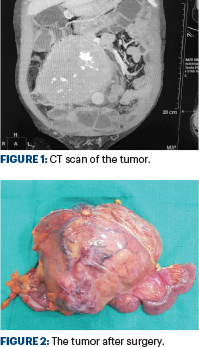The Lindy effect (also known as Lindy’s Law) is a theorized phenomenon by which the future life expectancy of some nonperishable thing, such as a technology or an idea, is proportional to its current age. Thus, the Lindy effect proposes the longer a period something has survived to exist or be used in the present, the longer its remaining life expectancy. Longevity implies a resistance to change, obsolescence, or competition and greater odds of continued existence into the future.
Open surgery in general and cancer surgery in specific is subject to this rule or effect. With no conflict against minimally invasive surgery including robotic surgery, I believe open cancer surgery is not only still absolutely relevant but is here to stay. This is especially applicable to resource-constrained countries but also to general surgical oncologists the world over, who must deal with a wide spectrum of cancers affecting various different organs on a day-to-day basis.
Case Illustration
Here is a real-world case of mine as an example. I am sure each day across the world, surgical oncologists deal with similar cases.

A 63-year-old woman presented with a very large abdominal tumor clinically occupying almost the whole of the abdomen (Figure 1). A biopsy proved it to be a sarcoma. She received neoadjuvant radiotherapy followed by exploratory laparotomy and en bloc R0 resection of the tumor and segmental bowel resection (Figure 2). Postoperative recovery was good, with histopathology revealing a margin-free resection. She is doing well 1 year later, without any features of recurrence.
Open surgery is definitely the approach to removing such large tumors. Any compromise in R0 resection is bound to be met with recurrences and poor survival.
Hence, as long as large tumors continue to afflict us, open surgery is here to stay, exactly following Lindy’s Law. Therefore, it is important for current and future generations of surgical oncologists to be familiar with open surgery as much as with newer and advanced surgical techniques and never to underestimate or belittle its role.
—Raj Mohan, MS, DNB, Mch, FEBS
Surgical Oncologist
Indian Air Force, Mumbai, India

